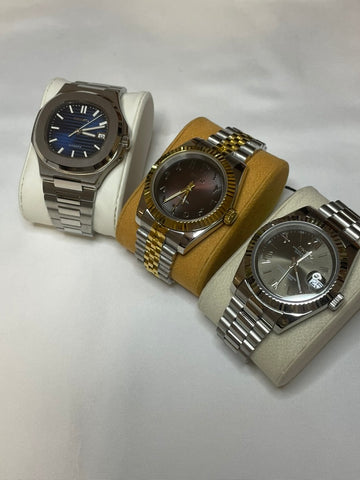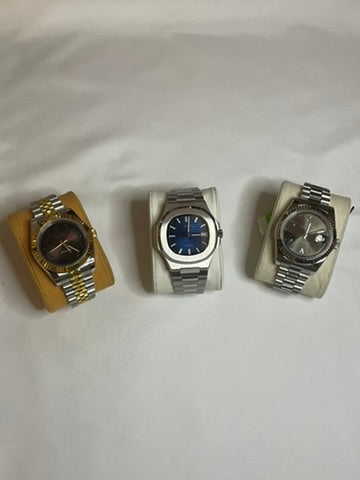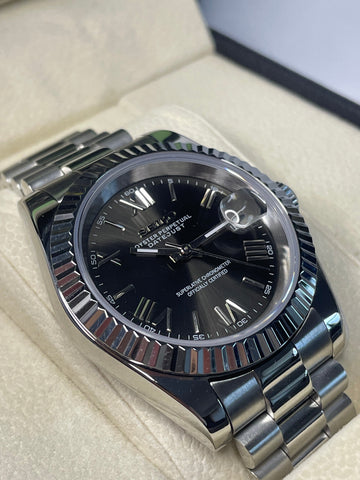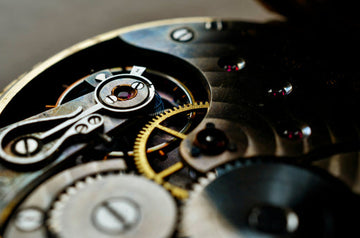How to choose the perfect wristwatch
Choosing the right watch can be a daunting task, especially with so many options available. A watch is not only a practical timepiece, but also a symbol of personal style, prestige, and functionality. With the right approach and clear priorities, you can find a watch that will not only impress you, but also complement your style and lifestyle. Here's a guide to help you choose a watch that suits your needs, style, and occasion.
1. Determine the purpose of the watch
Before buying, consider why you need the watch. Will you wear it every day, for special occasions, for sports activities, or in a business environment? The intended use will significantly influence your choice.
-
Everyday use : Choose a versatile watch that combines elegance and durability. Models with a minimalist design are a great choice for everyday wear, as they go with a variety of clothing styles.
-
Formal occasions : A classic watch with a minimalist design is an ideal choice. Look for watches with high-quality materials, such as leather and stainless steel.
-
Sports activities : Look for a sports watch with additional features like a stopwatch, water resistance, and rugged construction. Additional aspects like comfortable silicone straps can enhance the user experience.
2. Choose the right style
A watch should reflect your personal style. Consider the following categories:
-
Classic Analog Watch : Great for formal occasions and business settings. Watches with leather straps and elegant hands are a wonderful addition to a formal wardrobe.
-
Digital watch : Suitable for sports activities or casual wear. Digital displays are clear and useful, especially during physical activities.
-
Smartwatch : Ideal for tech-savvy individuals who need more functionality. A great choice for health monitoring, notification management, and activity tracking.
3. Understand the mechanism of the clock
The difference between quartz and mechanical watches is important:
-
Quartz watch : Battery-operated, more affordable, and highly accurate, they are low-maintenance and ideal for everyday use.
-
Mechanical watch : Operated by springs and gears, valued for their tradition and craftsmanship, these watches often require more care, but are a great symbol of refined taste.
4. Materials and build quality
The material of the case and strap has a significant impact on the appearance, comfort, and durability of the watch.
-
Case : The most common materials are stainless steel, titanium, and ceramic. Precious metals such as gold and platinum are also used for luxury models. Ceramic models are lightweight and scratch-resistant, making them practical for everyday use.
-
Strap : Choose from leather, metal, silicone, or textile, depending on the occasion and comfort. Leather straps give a stylish look, while silicone straps are better for sports activities.
5. Watch size
The watch should fit your wrist. A watch that is too big or too small can look out of place and cause discomfort. Check the case diameter, strap width, and thickness of the watch. Larger watches fit larger wrists better, while smaller cases offer a more discreet look.
6. Functionalities and additional features
Additional features like water resistance, chronograph, date display, GPS or activity tracking can enhance the usefulness of your watch. Choose the features you actually need. For example:
-
Water resistance : Ideal for water sports enthusiasts or those who often wear the watch in adverse weather conditions.
-
Chronograph : Useful for measuring time in sports activities or professional use.
-
Smart features : Include monitoring of heart rate, steps, and other health indicators.
7. Budget
Set a realistic budget. Watches come in all price ranges, from affordable models to luxury pieces. The key is to find a balance between quality and price. Cheaper watches can offer great value if you choose a reputable brand, while luxury watches bring prestige and craftsmanship.
8. Brand and reliability
Established brands often offer higher quality, reliability, and better after-sales support. Also check the warranty and service options. Watches from reputable manufacturers often have a long lifespan and better maintenance support.
Conclusion
Choosing the right watch is a personal decision that combines your needs, style and budget. A watch is more than just a timekeeping device – it is a symbol of your personality, status and taste. By following these tips, you will find the perfect watch to accompany you through everyday challenges and special moments. Remember, the right watch is not just an accessory, but also an expression of your story and desire for precision and style.








